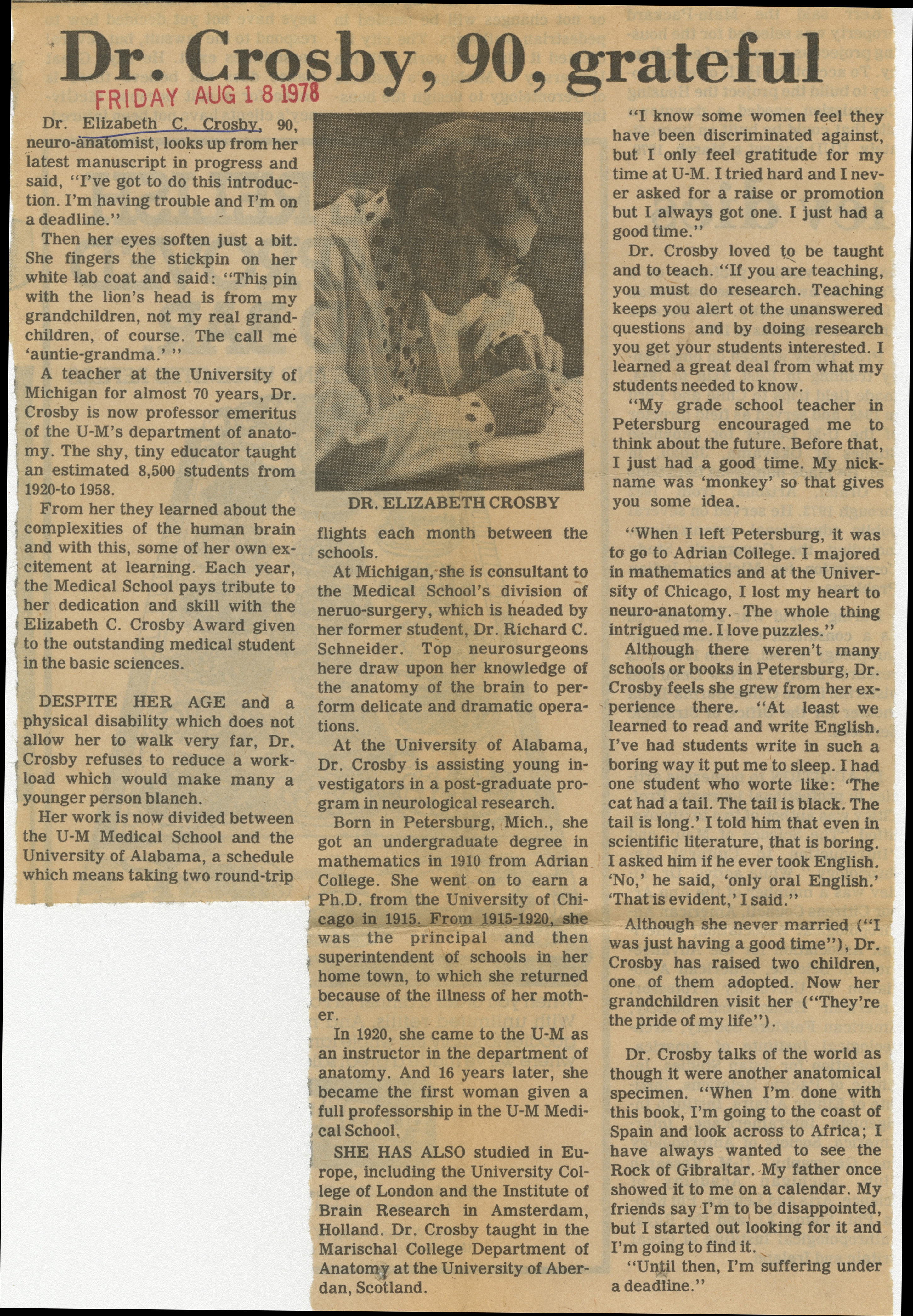Dr. Crosby, 90, grateful

Dr. Crosby, 90, grateful
Dr. Elizabeth C. Crosby, 90, neuro-anatomist, looks up from her latest manuscript in progress and said, “I’ve got to do this introduction. I’m having trouble and I’m on a deadline.”
Then her eyes soften just a bit. She fingers the stickpin on her white lab coat and said: “This pin with the lion’s head is from my grandchildren, not my real grandchildren, of course. The call me ‘auntie-grandma.’ ”
A teacher at the University of Michigan for almost 70 years, Dr. Crosby is now professor emeritus of the U-M’s department of anatomy. The shy, tiny educator taught an estimated 8,500 students from 1920-to 1958.
From her they learned about the complexities of the human brain and with this, some of her own excitement at learning. Each year, the Medical School pays tribute to her dedication and skill with the Elizabeth C. Crosby Award given to the outstanding medical student in the basic sciences.
DESPITE HER AGE and a physical disability which does not allow her to walk very far, Dr. Crosby refuses to reduce a workload which would make many a younger person blanch.
Her work is now divided between the U-M Medical School and the University of Alabama, a schedule which means taking two round-trip flights each month between the schools.
At Michigan, she is consultant to the Medical School’s division of neuro-surgery, which is headed by her former student, Dr. Richard C. Schneider. Top neurosurgeons here draw upon her knowledge of the anatomy of the brain to perform delicate and dramatic operations.
At the University of Alabama, Dr. Crosby is assisting young investigators in a post-graduate program in neurological research.
Born in Petersburg, Mich., she got an undergraduate degree in mathematics in 1910 from Adrian College. She went on to earn a Ph.D. from the University of Chicago in 1915. From 1915-1920, she was the principal and then superintendent of schools in her home town, to which she returned because of the illness of her mother.
In 1920, she came to the U-M as an instructor in the department of anatomy. And 16 years later, she became the first woman given a full professorship in the U-M Medical School,
SHE HAS ALSO studied in Europe, including the University College of London and the Institute of Brain Research in Amsterdam, Holland. Dr. Crosby taught in the Marischal College Department of Anatomy at the University of Aberdan, Scotland.
I know some women feel they have been discriminated against, but I only feel gratitude for my time at U-M. I tried hard and I never asked for a raise or promotion but I always got one. I just had a good time.”
Dr. Crosby loved to be taught and to teach. “If you are teaching, you must do research. Teaching keeps you alert to the unanswered questions and by doing research you get your students interested. I learned a great deal from what my students needed to know.
“My grade school teacher in Petersburg encouraged me to think about the future. Before that, I just had a good time. My nickname was ‘monkey’ so that gives you some idea.
“When I left Petersburg, it was to go to Adrian College. I majored in mathematics and at the University of Chicago, I lost my heart to neuro-anatomy. The whole thing intrigued me. I love puzzles.”
Although there weren’t many schools or books in Petersburg, Dr. Crosby feels she grew from her experience there. “At least we learned to read and write English. I’ve had students write in such a boring way it put me to sleep. I had one student who wrote like: ‘The cat had a tail. The tail is black. The tail is long.’ I told him that even in scientific literature, that is boring. I asked him if he ever took English. ‘No,’ he said, ‘only oral English.’ ‘That is evident,’ I said.”
Although she never married (“I was just having a good time”), Dr. Crosby has raised two children, one of them adopted. Now her grandchildren visit her (“They’re the pride of my life”).
Dr. Crosby talks of the world as though it were another anatomical specimen. “When I’m done with this book, I’m going to the coast of Spain and look across to Africa; I have always wanted to see the Rock of Gibraltar. My father once showed it to me on a calendar. My friends say I’m to be disappointed, but I started out looking for it and I’m going to find it.
“Until then, I’m suffering under a deadline.”
DR. ELIZABETH CROSBY